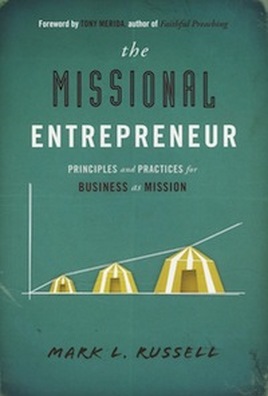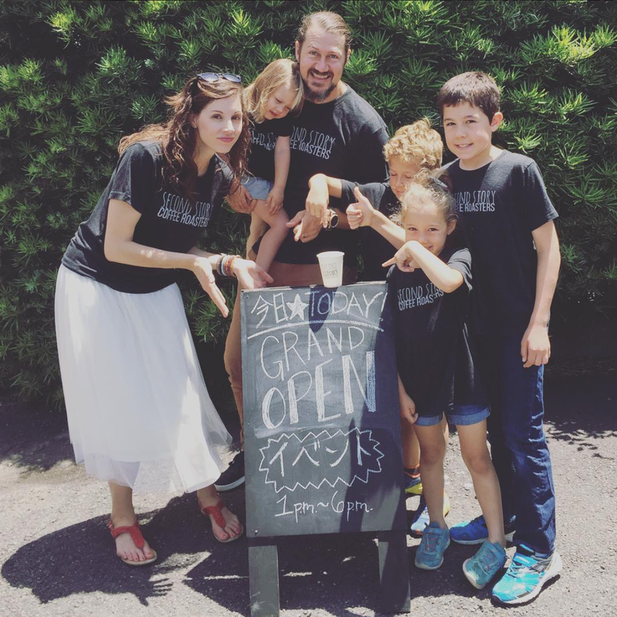|
Much has been happening for Second Story Coffee Roasters, including small-scale renovation of the shop location, the pre-open of our business, the launch of our website allowing customers to join a coffee subscription club, and the planning for our grand opening event on June 4th. This has required all of us, all days of the week. (Though I usually spend at least one day fully in my PJs, drinking coffee and reading, to make up for it!) We had heard that starting a business requires the investment of your heart, your time, and your finances, and it is totally true. We are excited for what we have begun, but it is up to God now whether or not it will flourish. We still have not been able to find investors, please pray that God would provide them. Because we are deep in the details and processes of starting a new venture, which one of my favorite people once described as "trying to take a drink from a fire hydrant," it is easy to forget the WHY of what we are doing. We have taken a time or two together as Second Story staff (Rob, Tara, and Masayoshi) to discuss, debate, and pray about what God has in store for us as a shop and business within the community of the Oya neighborhood of Shizuoka, Japan. The vision statement of Second Story Coffee Roasters is the following: We exist to cultivate a safe and vibrant middle space, where mainstream Japanese can encounter the values of the Kingdom of Jesus and experience gospel-centered community. God is already moving within this vision, giving us relationship with the workers of the cafe next door to us, a few of whom seem drawn to us and with whom we have been able to discuss: What is the meaning of life? Why were humans made? Why do we exist? We are grateful. But we are also exhausted, us and our fellow Second Story workers. Really, we experience the truth of 2 Corinthians 12:9, where Paul recalls God's words to him, "My grace is sufficient for you, for my power is made perfect in weakness." We are a weak and motley crew, four of us not native to the language and customs, none of us experienced in business, six children between us, some of us living with illnesses of varying kind, but ALL of us being brought to a place where we remember by WHOSE strength any of this is possible. Several times a week, I have the thought, "What we are doing is CRAZY. Why would God choose us for this job? For the job of living in Japan even?" But the answer to that is never far behind, when I am reminded softy of the heroism of our Creator, who challenges his people to daily pick up their cross and follow Him, to be willing to be a weak tool in His strong hand, for ends and goals known mainly to Him alone. Following Jesus into the unknown of faith is the job of every Christian, and we are greatly encouraged by thoughts of His people around the globe, doing hard things for Him. Please pray with us for the success of this business, so that it might open doors to the Kingdom for the people around us. We long to see the impact of Jesus's love on this Oya neighborhood, where we have lived and labored since our move to Japan nine years ago. Jamie O'DonnellWife, Mother, Founder, Writer Previous posts from Jamie and SSCR.
0 Comments
The Navigator’s calling is simple yet very profound, To advance the Gospel of Jesus and his Kingdom into the nations through spiritual generations of laborers living and discipling among the lost. The last part has an interesting word: “living”. To some this would mean “where you live”, yet I believe it has bigger implications. I believe this word means “your entire life” or “as you live”. If this is the case then we are to be making disciples where we live, where we play, and even where we work. Every part of life. I began my journey of discovering God in the workplace as I was graduating college. Perfect timing. The commands were quite clear in the Bible: to work heartily as unto the Lord and to do everything for the glory of God (Ephesians 6:5-8 and Colossians 3:22-24). The lost were all around me, so I had no problem believing Jesus when he said the harvest was plentiful. The longer I work (which I’ll admit has not been very long) the more God teaches me about following him in every aspect of my life, even work. When I went to the Entrepreneurial Readiness Workshop (ERW) I didn’t really know what to expect. I didn’t have a business idea ready or even have one brewing. Not a feasible one, anyway. Yet I know now that God used that workshop to teach me more about himself. And I don’t have to start a Missional Enterprise to put what I learned into practice! The triple bottom line is foundational to running a successful Missional Enterprise. Yet this same triple bottom line has the ability to inform everyone’s work from a corporate job to an entrepreneurship.
While I don’t know where God is leading me in regards to starting a Missional Enterprise or joining an existing one yet, I am already able to apply lessons from the ERW to my current workplace. How will you bring glory to God in every aspect of your life? GEN Desk Contributing Author and Nav 20s City Leader“Tom, you’re no longer strange to me.”
What in the world did Ivan, my close friend of two years, mean by that? My wife, our two middle-schoolers, and I had moved into a country that every national who had the chance was fleeing. Food was scarce. Utilities were sporadic. Unemployment was skyrocketing. Corruption was rampant. New criminal gangs were terrorizing the populace as they were fighting each other and carving out their territories. Our move from the suburbs of America to this collapsing country didn’t seem odd to me. It seemed more like an adventure to make a difference in the world by distributing humanitarian aid and leading bible studies with young adults who had never seen a Bible. I met Ivan and his wife on our first day in his country. They were both college graduates and were unemployed. I hired them as our language tutors, our interpreters, and our first employees. We shared life with them for hours on end for 5-6 days a week for two years. The bible studies seemed to be going well. Ivan was translating the materials from English into his native language. Using his artistic ability he also illustrated them with pen and ink drawings. Ivan was a new believer himself so our times in the Word were rich and special for him. I thought I was really connecting with Ivan, so what was that comment about me, “no longer being strange?” After our first 18 months in the country, I changed my focus from humanitarian aid to missional enterprise (BAM). As the enterprise grew we were able to employ more and more people. Job creation took the place of humanitarian handouts. Gainful employment restored dignity and removed the stigma of inferiority. The needs of our enterprise began to create auxiliary enterprises that provided employment for more people. This ripple effect of wealth creation made more sense to Ivan than our previous attempts of propping people up with bailouts. So why did Ivan think I was strange? When I asked him he gave me two reasons:
He also gave me two reasons why I was no longer strange to him:
It makes me wonder how many others have thought of me as strange when I thought I was just trying to help. - Missional Entrepreneur, GEN Desk Contributing Writer Impacting communities by bringing jobs and dignity! What other businesses do you think could provide TBL transformation?
By JACK BENJAMIN
I will never forget the moment 24-years ago when Aldo Berndt, the Latin America Regional Director at that time and a man for whom I have deep respect, made this stunning comment: “It is cruel to talk about the Great Commission in two-thirds of the world.” “How could that be?” I thought to myself. “The Great Commission is the reason my wife and I just moved to Colombia with our three young children!” After Aldo’s bold statement, he saw my distress. So with a gentle smile, Aldo went on to clarify. When fully funded gift-income missionaries launch a new work with the hope of reproducing and sending out laborers, those new laborers often don’t have the funding capacity or time to replicate what the missionary had modeled. The consequence is that future generations of laborers may become discouraged and end up giving the work of the ministry to the “full-time” workers. “If we want to see nations reached for Christ,” Aldo went on to say, “we must offer the majority of people a different model, one that is more realistic and replicable in their context.” Since that time, Navigators in Latin America have been taking strategic initiatives in response to the challenge that their Regional Director articulated. For example, Jimmy Payton had started a leather goods manufacturing and export business in Bogotá, named Tenazcol. Employees, customers and suppliers—all those relating in some way with Tenazcol—saw that this business was different. They heard the Gospel message and saw it in action. Many were irresistibly drawn to Christ and followed Him. The daily opportunity for Jimmy to work side-by-side with his staff proved to be an ideal arrangement for life-on-life discipleship. Some of those employees were discipled well and have gone on to lead the next generation in Colombia. A decade later, Jimmy and Roberto Blauth (from Brazil), who were serving in Aguascalientes, Mexico, began a construction business called Casas Mas that provided low-cost homes to the community. As with Tenazcol, Casas Mas became a place where life-on-life discipleship and the Scriptures combined with God’s Spirit to make Jesus real to many. It wasn’t long before a vibrant community of faith grew up in Aguascalientes and, energized by Casas Mas, contributed significantly to a new generation of laborers in Mexico. The word spread and a number of emerging laborers from around Latin America chose to intern in Casas Mas and serve in the Aguascalientes work as part of their ministry training. Today most of them are laboring fruitfully around the region. In recent years, a group of Navigator alumni who are successful Mexican professionals, including a former Casas Mas general manager, have come together to launch a new generation of missional enterprises like Tenazcol and Casas Mas. United by this passion, they provide mentoring, subject matter expertise, whole-life discipling and funding to aspiring missional entrepreneurs—people who can serve as Gospel pioneers in other nations. The Navigators have been involved with missional enterprises for more than three decades. Each of the seven regions in the Worldwide Partnership has missional enterprise initiatives as part of their overall strategy to advance the Navigator calling. Such enterprises help not only to gain access to closed or hard-to-reach places, but also to establish credibility with the local community in which they are operating. Please pray that God will continue to lead our leaders to work together to start and sustain missional enterprises that truly fulfill our calling. You can watch a short video about Jimmy and Roberto in Aguascalientes below. Jack Benjamin is director of the Global Enterprise Network for our Worldwide Partnership. We often praise individuals who are entirely themselves, pulling themselves up by their own bootstraps and achieving success. We are exhorted through scriptures like Psalms 139:14 to stand as individuals and focus on how God has created us. “ I praise you, for I am fearfully and wonderfully made.  It is true how God has uniquely crafted every person. But if we are imposing or separating ourselves from others through our "uniquely individual" perspective, how do we address "adapting" to engage the values and customs of the other cultures we are seeking to live and disciple among? In “The Missional Entrepreneur,” Mark Russell addresses a crucial topic regarding the necessity for missional entrepreneurs to understand and respect their new cultural context. In the past, many missionaries sent to the "lost " were Americans. As Americans, we have been raised in an “Individualistic, Universalistic, and Monochromatic” environment. In other words, Americans are taught and naturally bring to the mission field how to:
The cultural values Americans have been raised in are viewed differently in the cultures they are seeking to live and disciple among. For example, Asian and Latin American cultures often function as “Collective, Particularistic, and Polychromatic” socities. This challenges missional entrepreneurs to:
Understanding and abiding to these cultural adaptations is not denying your self or your heritage. “Contextualizing” is living out the calling to serve as a relational and personal witness, to give up our self, and to love others first in a new set of cultural values. Paul describes his journey as: "For though I am free from all, I have made myself a servant to all, that I might win more of them. To the Jews I became as a Jew, in order to win Jews. To those under the law I became as one under the law (though not being myself under the law) that I might win those under the law. To those outside the law I became as one outside the law (not being outside the law of God but under the law of Christ) that I might win those outside the law. To the weak I became weak, that I might win the weak. I have become all things to all people, that by all means I might save some. I do it all for the sake of the gospel, that I may share with them in its blessings. Every missional entrepreneur will face the challenge to remain comfortable and stagnant in their own cultural context. Yet, remaining unwilling to see the world through a different perspective, or understand the customs of different cultures, will weaken our ability to see the gospel of Jesus and his Kingdom advance through generations of laborers living and discipling among the lost. - GEN Desk Director Consider Foreign to Familiar by Sarah Lanier for further reading on cultures, adaptation, and contextualization.
|
Categories
All
Archives
March 2020
|




 RSS Feed
RSS Feed
